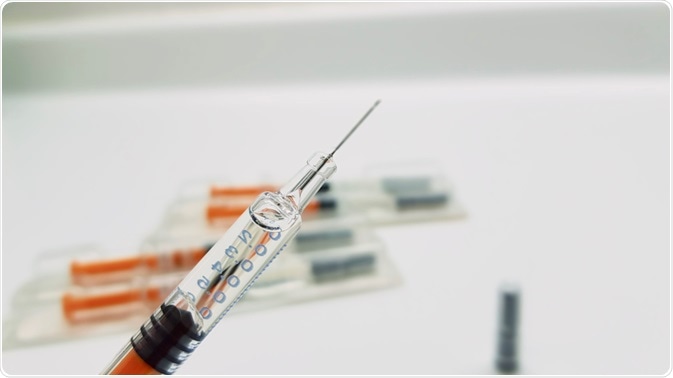Heparin is a naturally occurring anticoagulant that prevents blood clots from forming. It has several uses in medicine; however, there is controversy surrounding the use of heparin.

Image Credit: enriscapes / Shutterstock.com
Side effects
One of the most serious side effects of using heparin is heparin-induced thrombocytopenia (HIT). This occurs as the result of an immune response that targets and attacks platelets in the blood. Other less common side effects include osteoporosis and hair loss.
Inappropriate versus appropriate use
In various studies, the inappropriate use of heparin has led to poor outcomes. The general consensus among providers of care for stroke victims is that efficacy studies of intravenous unfractionated heparin (UFH) have been inadequate and failed to test the substance sufficiently in patients with specific forms of stroke and occlusive vascular lesions.
In cases where contraindications to clot removal exist, the use of UFH may still be appropriate for the treatment of patients with certain types of acute ischemic stroke (AIS). These stroke subtypes include large-artery occlusions with critical stenosis, cerebral venous thrombosis, and cardiac source of embolism.
Unfractionated heparin is sometimes used to help achieve therapeutic coagulation in combination with warfarin when the use of warfarin is indicated. However, current AIS guidelines advise not using heparin to treat AIS, irrespective of what the underlying condition is, while the American College of Chest Physicians guidelines advises using UFH to treat patients with AIS with a cardioembolic source.
In cases where UFH is used to treat AIS, patients must have their blood pressure managed properly so that the risk of hemorrhagic transformation is reduced. To ensure that thrombocytopenia does not occur as a result of heparin use, platelet counts should be included as a part of monitoring for heparin toxicity.
One factor that is agreed on between providers of stroke care is that therapeutic doses of low-molecular-weight heparin (LMWH) do not play any role in the therapy for AIS. An analysis of the safety and efficacy profiles from ten randomized control trials of LMWH used in AIS showed that although the agent reduces the incidence of venous thromboembolic events in AIS patients, the extracranial bleeding risk is not great enough to outweigh the improved rates of death and disability. Providers of stroke care, therefore, came to a general consensus that there is no role for LMWH in the treatment of this condition, although it may be used in combination with warfarin to help prevent the occurrence of deep vein thrombosis.
Contamination
Pharmaceutical-grade heparin is derived from the mucosal tissue of animals that have been slaughtered for meat, such as pigs and cattle. Pharmaceutical heparin is therefore significantly more likely to contain impurities than compared to synthetic heparin. In December 2007, the U.S. Food and Drug Administration (FDA) recalled a batch of heparin due to the growth of a bacteria known as Serratia marcescens in several unopened syringes. Infection with this bacteria can be life-threatening.
In March 2008, the FDA announced major recalls of contaminated heparin stocks imported from China. The contaminated heparin caused the death of 81 people in the United States. The contaminant was an over-sulfated derivative of chondroitin sulfate, which is a shellfish supplement commonly used to treat arthritis.
Overdose and casualties
A heparin overdose can cause fatality and, in 2006, the drug caused worldwide controversy when three premature babies died due to accidental heparin overdose at a hospital in Indianapolis.
In a similar accident that occurred in 2007, a nurse at Cedars-Sinai Medical Center in Los Angeles, California administered a lethal dose of heparin that was 1,000 times the recommended dose to the actor Dennis Quaid’s baby twins. The mistake occurred as a result of similar labeling between adult and infant heparin products. The Quaids sued the manufacturer Baxter Healthcare Corp and received $750,000 in compensation.
References
Further Reading
Last Updated: Jan 13, 2023